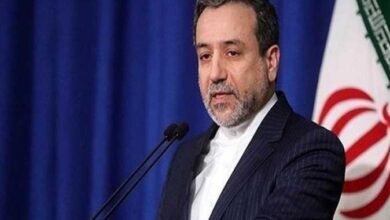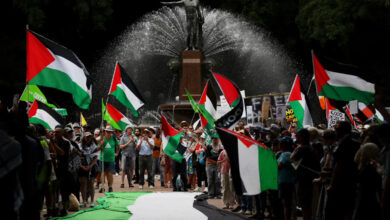Israel legalized three settler outposts on Tuesday in a move the Palestinians said was a dismissive response to a letter from president Mahmoud Abbas calling for a settlement freeze and Washington called a source of concern.
A ministerial committee has decided "to formalize the status of three communities which were established in the 1990s," the office of Prime Minister Benjamin Netanyahu said.
The move sparked an angry reaction from the Palestinians, Israeli settlement watchdog Peace Now, which said it was the first time the government had created new settlements since the 1990s, and Denmark which holds the European Union presidency.
The three outposts — Bruchin, Rechelim and Sansana — had no Israeli legal status since they were set up, but will now join the 120 official settlements dotted across the occupied West Bank that are home to more than 342,000 people.
The Palestinian leadership said the decision was "expected" and said it was "the Israeli answer" to a letter from Abbas to Netanyahu, in which he laid out Palestinian grievances over the collapse of the peace process and outlined his demands for restarting negotiations.
Central to the letter was the demand for a settlement freeze.
"The decision on the settlements is the Israeli answer to president Abbas's letter," presidential spokesman Nabil Abu Rudeina told AFP.
But an Israeli official denied the move was tantamount to creating new settlements.
"This decision does not change the reality on the ground. It does not establish new settlements or expand existing settlements," he said.
His remarks were roundly denounced by Peace Now's Hagit Ofran, who accused the government of creating a smoke screen.
"This is the first time since 1990 that the government decides on establishing new settlements, and the government's maneuvre — establishing a committee to establish the settlements — is a trick aimed at hiding the true policy from the public," she said.
The United States said it had raised concerns with its Israeli ally over the decision, which it said was unhelpful to making peace with the Palestinians.
State Department spokeswoman Victoria Nuland reiterated Washington's opposition to settlement activity in the occupied West Bank and said the United States asked Israel, through its embassy in Tel Aviv, for "clarification."
"We are obviously concerned," Nuland told reporters.
"We don't think this is helpful to the process, and we don't accept the legitimacy of continued settlement activity," she said.
The decision was announced just as US envoy David Hale was visiting the region in an effort to revive the moribund peace process.
Hale met Tuesday in Amman with Jordanian Foreign Minister Nasser Judeh, who condemned the Israeli decision. Hale also held talks with Israeli and Palestinian negotiators, Nuland said.
Current EU president Denmark said the Israeli move "represents a fundamental threat to a two state solution" to the Middle East conflict.
Foreign Minister Villy Soevndal expressed "great disappointment" at what he called "Israel's tactic of constantly nibbling away, establishing real and concrete facts on the ground on Palestinian territory that are illegal."
Under terms of a Supreme Court ruling last August, the Israeli government was required to address the legal status of some 16 outposts.
In six cases, the government pledged to demolish the outposts, while it said it would legalise the status of 10 others, among them Bruchin, Rechelim and Sansana.
On Monday night, Netanyahu's inner circle, the Forum of Eight, decided to ask the Supreme Court to extend its deadline for the demolition of the Ulpana outpost, which is to be razed by 1 May.
"We will ask the Supreme Court for a postponement in order to give us time to deal with it," Netanyahu told army radio on Tuesday. "We are considering a few options."
Yesh Din, the Israeli NGO that had petitioned the court to remove the outposts on behalf of Palestinian land owners, denounced the move as "driven by political considerations at the expense of the rule of law."
Peace Now says there are more than 100 "illegal" outposts which were set up by various Israeli governments since the 1990s in an unofficial and illegal manner.
Israel only considers settlement outposts to be illegal, but the international community views all settlements as unlawful, whether approved by the government or not.




